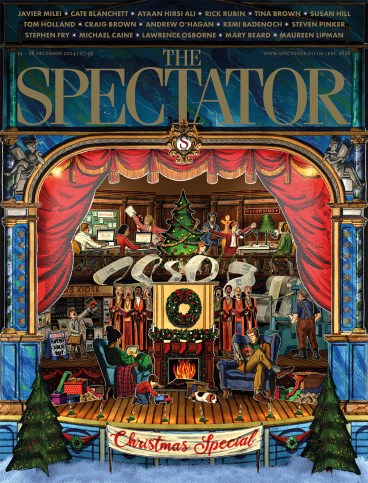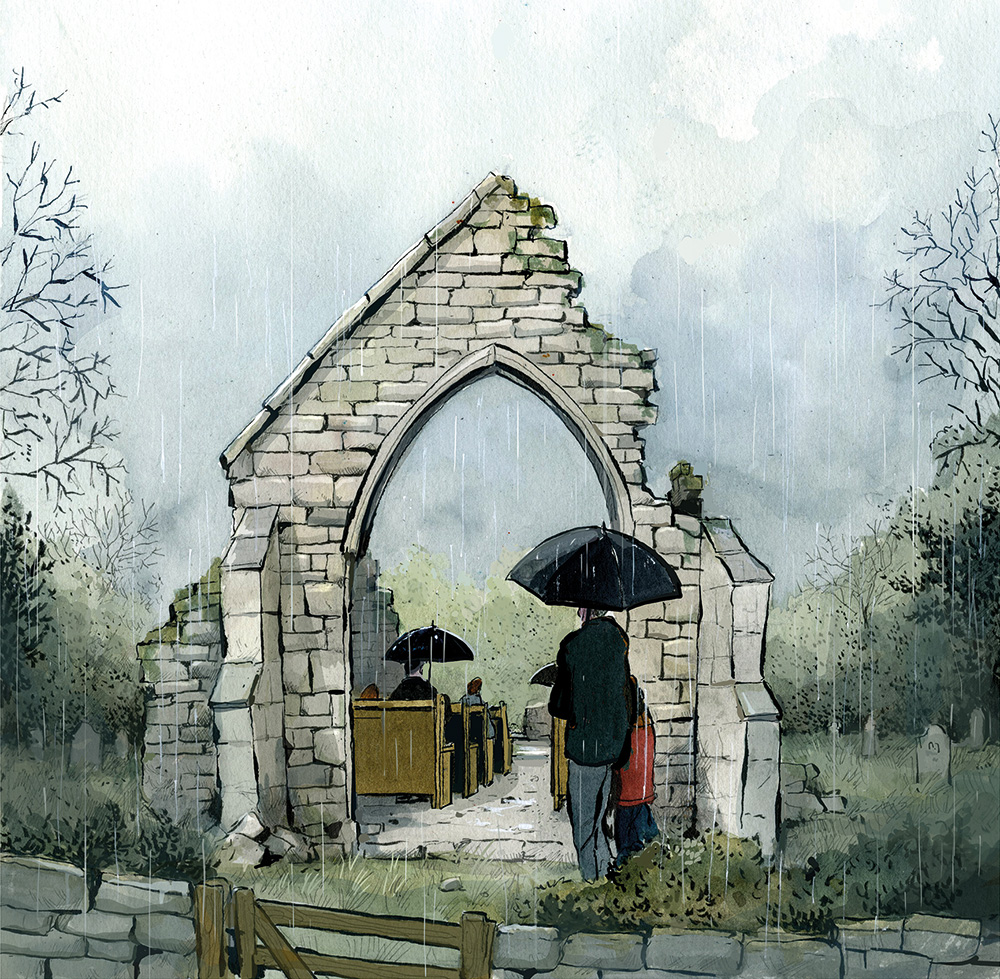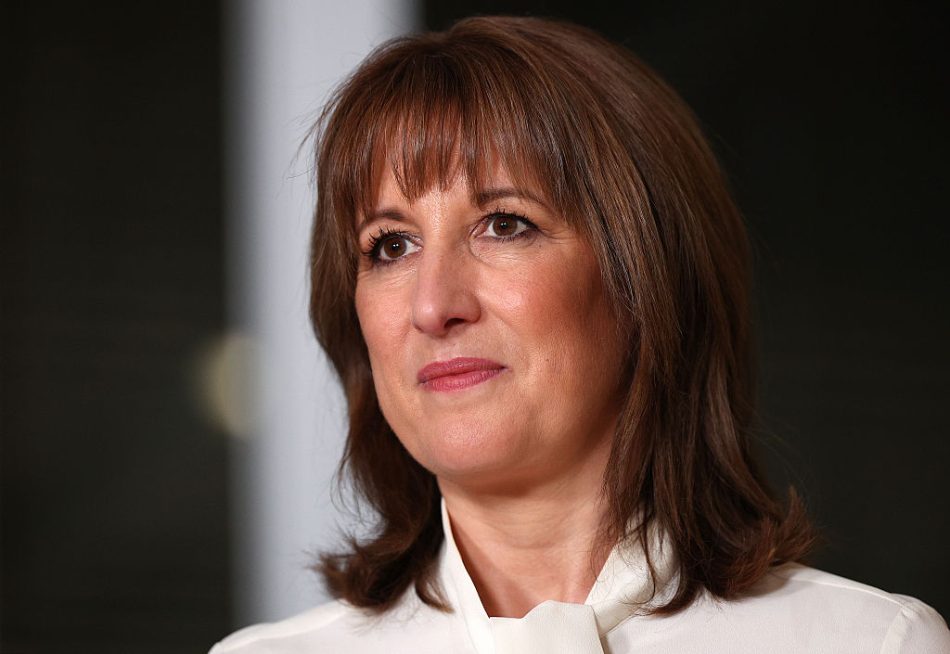
If you are of a traditional turn of mind, you might well go to church this Christmas, sing the carols you knew in childhood and feel a bit of a Dickensian glow. If you are already Christian, the experience will confirm your sense that what is commemorated is the most stupendous thing in human history – the arrival of Jesus Christ, whether or not you believe the stories as told in the readings.
Statistically, however, it is highly unlikely that you will be going back to church for months – probably not until next year. If you did venture into your local church on a normal Sunday, you would find a tiny band of old people like me who go regularly and who are wondering, all the time, how much longer it can all continue.
Listening to Choral Evensong on Radio 3 is nice to do, but it’s not the same as being religiously observant
When Dr Johnson visited the Hebrides, he famously exclaimed: ‘That man is little to be envied, whose patriotism would not gain force upon the plains of Marathon, or whose piety would not grow warmer among the ruins of Iona.’ Deeply learned and Christian as he was, his mind easily reverted, in Iona’s ruins, to the era when the monastic hours had echoed in those walls.
In Scotland today, where Johnson’s piety once grew warm among the ruins, churches are closing every single week. It has been calculated that 40 per cent of Church of Scotland churches have closed in the past decade, including major architectural sites such as Brechin Cathedral. Roman Catholic churches are likewise closing down at a rate of knots all over Britain, and the Church of England, which is in the unlucky position of having guardianship of all the extant pre-Reformation churches, is faced with the problem of what to do with such places, which are scarcely, if ever, attended.
When the faithful few die out, what is going to happen? I used to think that, in the case of mainstream Anglican churches, ‘in quires and places where they sing’ (as the old Prayer Book has it) the congregations were still holding up, and this suggested that religion was not as dead as the statisticians might have us believe. To this number – of the hundreds, thousands, even – who like choral evensong, might be added the crowds who come to church once or twice a year at Easter or Christmas. But I now hae me doots.
Listening to Choral Evensong on Radio 3 is a nice thing to do, but it is not the same thing as being religiously observant. Not at all. Going to a cathedral service is surely, for many of us, only a step away from Radio 3. All over Britain, you find places which once had a useful function and which are now ‘heritage sites’ – former mills or Victorian factories, which have been restored (‘mummified’ would be a better term) and have no function other than as a fun day out for the family. Steam railways run by volunteers. Are the cathedrals of England really so different from these places, with their souvenir shops and votive candle stands? So there will be these ‘heritage site’ cathedral revivals, with cheese scones and toilet facilities, and afternoons rounded off with Stanford’s ‘Magnificat in C’ for a bit of uplift.
Some places of worship, by contrast, will continue to be recognisably Christian. The Brompton Oratory in London is packed out with those who love the old settings of the mass, sung by a stupendous choir. Anyone attending the High Mass there on a Sunday could easily believe that, if such forms of worship were on tap every Sunday and in every part of the country, the work of Mary Tudor would be complete.
Just behind the Oratory, at Holy Trinity Brompton, the Happy Clappies are similarly packing in huge congregations. Optimists among this group of Christians would like to believe that if only more people studied the Alpha Course and began to read the Bible in a fundamentalist sense, there would be a revival of Christian belief.
Both the traditional Catholics and the evangelicals would probably be happy to embrace the late Pope Benedict’s term – ‘lighthouses’ – to denote those places of worship which are still full of enthusiastic believers, and which, along a darkening coastline, continue to guide the storm-tossed mariners to shore. It is a good image, and for a few more decades I guess that such lighthouses will probably flourish. The optimistic Christians, surveying the hundreds who crowd to such fanes, won’t allow themselves to realise that their ‘large’ congregations represent an absolutely tiny percentage of the population as a whole. Three hundred people going to mass in a suburban Roman Catholic parish looks like a large number until you remember that this is in a catchment area of tens of thousands of unchurched, secular-minded people. Whereas a high proportion of the Sikhs, Muslims and Hindus in such an area would continue to visit the temples or mosques, the ‘cultural Christians’ long ago got out of the habit.
Man was a ritualist before he could speak, wrote Chesterton; and Charles Darwin speculated that humanity had music before it found words. When they began to speak, how-ever, human beings were mythopoeists. They made myths. They endowed experience with mythic significance, peopled the woods and caves and ocean waves with deities.
There are those who would like to revive this capacity artificially – ‘Wicca’, druids, Morris-men – and good luck to these sillies, but it is not the same as having all this stuff in your veins, in your instincts. Likewise, those of us who were brought up in a still-just-about Christian environment, hearing Bible stories and hymns at school assemblies, respond, on the rare occasions when we go to church – at Christmas or at funerals – as we might to a language we learnt in childhood and have more or less forgotten.
However many Alpha courses they attend, the secular majority will never start going to church. It’s over
But the myth-making knack, the ‘language’ of myth and ritual, which would seem to be so essential a part of being human, and which our Hindu, Muslim and Sikh friends still retain, has been lost to the secular majority, who are no longer even cultural Christians. And it is for that reason that I have come to believe that, however many Alpha courses they attend, or however many choral evensongs or polyphonic masses they hear, the secular majority will never start going to church. It’s actually over. By ‘it’, I mean the shared Greco-Judeo-Christian culture which fed and shaped the human imagination for the past 2,000 years. ‘It’ was probably over years ago.
The ‘lighthouse’ Christians will be analogous to the Academy of Plato in Athens. Some 876 years passed between the death of Plato and the closure of his Academy by the Emperor Justinian in ad 529. The ‘lighthouse’ Christians among us, like the dear old disputatious Platonists in Athens, will no doubt continue to defy the inevitable movement of history. For those of us who believe, the Everlasting Gospel will go on being true. But the end of Christendom is not only inevitable: in north-western Europe, it has already happened. If you do not believe me, go to Scotland. If that does not persuade you, go to Sweden.
I suspect we in Britain are nearer the equivalent of 529 than we realise, and that in less than 50 years, those in charge of such matters will decide that the Gothic cathedrals of Europe will be allowed to become like the Temples of Paestum, bare-ruined choirs of a forgotten cult. The piety of the learned will be ‘warmed’ in such ruins, but for most visitors – like the baffled tourists who drift round Westminster Abbey today taking selfies of themselves at the Shrine of Edward the Confessor – the core, the essence of why the building was erected and what once went on there, will be as impenetrable as the piety of ancient Athens is to us.
A.N. Wilson joined Damian Thompson on the most recent episode of Holy Smoke, The Spectator’s religion podcast, to discuss his article:








Comments